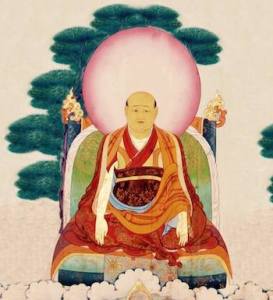 For English-reading fans of Dza Patrul Rinpoche (rdza dpal sprul rin po che, 1808–1887) these are bountiful times. July saw the publication of Matthieu Ricard’s collection of stories and texts, Enlightened Vagabond, after some three or four decades of research and preparation. This month’s A Gathering of Brilliant Moons includes translations of no less than four texts from the master (by Holly Gayley, Joshua Schapiro and Sarah Harding), and The Essential Jewel of Holy Practice will be released shortly, too.
For English-reading fans of Dza Patrul Rinpoche (rdza dpal sprul rin po che, 1808–1887) these are bountiful times. July saw the publication of Matthieu Ricard’s collection of stories and texts, Enlightened Vagabond, after some three or four decades of research and preparation. This month’s A Gathering of Brilliant Moons includes translations of no less than four texts from the master (by Holly Gayley, Joshua Schapiro and Sarah Harding), and The Essential Jewel of Holy Practice will be released shortly, too.
Patrul Rinpoche, like most Tibetan masters, has several names. He is often called Dza Patrul (Rinpoche) in reference to his native Dzachukha, and more formally he is Orgyen Jigme Chökyi Wangpo (o rgyan ‘jigs med chos kyi dbang po). Another term which occurs in almost every book that features Patrul—and which almost always occasions a footnote—is Abu. This is both how he often refers to himself, as part of expressions such as Abu Hralpo (a bu hral po), Abu Lhöpo (a bu lhod po) and “old dog Abu” (khyi rgan a bu), and how his students often refer to him: as Abu Rinpoche or simply Abu.
But what does Abu mean? What, in other words, do all those footnotes have to say?
A note in E. Gene Smith’s Among Tibetan Texts (p. 332, n. 836) explains A bu hral po as “ragged old one”, clearly taking hral po to mean ragged and a bu alone to mean someone advanced in years. Susanne Fairclough (A Treasure Trove, p. 451) translates the same expression as “old Uncle Tatters,” thus introducing an avuncular connotation.
For Tulku Thondup Rinpoche, however, the sense is more fraternal. In Masters of Meditation and Miracles (p.227), he explains Abu as “elder brother”.
While these explanations either hinge upon or at least allow for a degree of senescence, Holly Gayley’s note in A Gathering of Brilliant Moons (p. 163 n.32) makes juvenility the defining characteristic. In reference to Patrul’s name of A bu lhod po, she tells us that abu is “a term of endearment for a young boy”.
Meanwhile, there is nothing about either age or familial ties in an entry that appears in a brief lexicon of Kham Riwoche dialect (based on the speech of Orgyen Tobgyal Rinpoche, who is himself often called Abu). The entry says that a bu signifies a friend (grogs po).
The relevant footnote in Enlightened Vagabond also ignores age and family, but does specify masculinity. Note 33 on page 226 informs the reader that abu is “an intimate yet respectful way to address a male person.”
So, there you have it: abu means an old person or a young boy, an uncle or an older brother, a relative or a friend, or simply a male person you wish to address respectfully.
If all this is rather confusing, one final footnote may yet be of assistance. According to the translators and editors of Wondrous Dance of Illusion (p. 254 n. 43), abu is “an affectionate epithet of Patrul Rinpoche.” Perhaps that is one interpretation on which we can all agree.
References
Gayley, Holly and Joshua Schapiro (eds.). A Gathering of Brilliant Moons: Practice Advice from the Rimé Masters of Tibet. Somerville: Wisdom Publications. 2017.
Longchen Rabjam, A Treasure Trove of Scriptural Transmission. Junction City, California: Padma Publishing. 2001.
Nevin, Heidi L. and J. Jaokb Leschly. Wondrous Dance of Illusion: The Autobiography of Khenpo Ngawang Palzang. Boston & London: Snow Lion. 2013.
Ricard, Matthieu. Enlightened Vagabond: The Life and Teachings of Patrul Rinpoche. Boulder: Shambhala Publications. 2017.
Smith, E. Gene. Among Tibetan Texts. Boston: Wisdom Publications. 2001
Sprul sku o rgyan stobs rgyal nas bed spyod gnang ba’i khams ri bo che pa’i tshig mdzod.
Tulku Thondup. Masters of Meditation and Miracles: The Longchen Nyingthig Lineage of Tibetan Buddhism. Boston: Shambhala. 1996.
